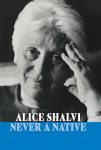Alice Shalvi, an Israeli professor and educator, has played a leading role in progressive Jewish education for girls and advancing the status of women in Israel. Her autobiography, Never a Native (Halban Publishers, 2018), reads almost as a personal diary. Otherwise, how could this 92-year-old recall the most minute details of her life?
The youngest of two children, Shalvi was born in Essen, Germany, to Benzion and Perl Margulies, religious Zionists who owned a wholesale linen and housewares business. In 1933, soon after Hitler’s rise to power in Germany, their home was searched, prompting her father’s move to London, England. The rest of the family followed in May 1934.
In London, Shalvi’s father and brother imported watches and jewelry. When the Blitz began, they temporarily moved to Aylesbury, 50 kilometres north of London.
In 1944, Shalvi studied English literature at Cambridge University. In 1946, she was sent to the Zionist Congress in Basel as a representative of British Jewish students and, in 1949, after completing a degree in social work at the London School of Economics, she immigrated to Israel, settling in Jerusalem. She became a faculty member in the English department of the Hebrew University of Jerusalem and she earned her PhD there in 1962.
In May 1950, Shalvi met Moshe Shelkowitz (changed later to Shalvi), a recent immigrant from New York, whom she married in October of that year. They had six children between 1952 and 1967; Moshe Shalvi died in 2013.
The 25th issue of Nashim: A Journal of Jewish Women’s Studies and Gender Issues (fall 2003) was dedicated to Alice Shalvi, “who made the dream of a journal devoted to Jewish women’s and gender studies possible.” When the concept of Nashim was first presented to her, the special issue notes that Shalvi greeted it not only with enthusiasm but as an idea whose time had finally come – she and her friends, pioneers of second-wave Jewish feminism, had raised it long before. “Subsequently, as rector of the Schechter Institute (1997-2001), [Shalvi] added her voice to the approval process for the issue’s first publication. She has remained on Nashim’s editorial board ever since, contributing her wise and warm guidance on issues of editorial and academic policy and herself serving as consulting editor for our issue on Women, War and Peace.”
In an interview by Elana Maryules Sztokman for the Lookstein Centre at Bar-Ilan University some years ago – after Shalvi had been awarded the 2007 Israel Prize for life achievement – Shalvi commented: “I felt that, through the work we had done on behalf of women, an enormous change had occurred in the status of women, in the self-image of women, in the self-assurance of women and, most importantly – because that’s what the prize recognized – in the awareness of the importance and centrality of the subject of the status of women in society at large.”
Shalvi spoke about the Pelech School for Girls and the Israel Women’s Network. “The school has created a generation of young modern Orthodox women who are changing that entire social system within modern orthodoxy,” she said. “The other thing I’m proud of is the years at the network, which saw the largest number of legislative changes and reforms in women’s status because what I call the ‘alumnae’ of the network were so prominent in the Knesset.”
In her autobiography, Shalvi emphasizes “that it’s all about the home,” and acknowledges the impact her parents had on her. “What I saw at home,” she writes, “was an open attitude, observance but openness. My mother always used to set an extra place at the table on Shabbat in case my father brought home a stranger from synagogue, as was the custom in those days. And, in my family, I learned about tzedakah in the very best sense – always a readiness to help others, not only from my father, who did it on a both public and personal level, but also from my mother.
“The other thing I absorbed was Zionism. It was a strongly Zionist household, and my father was very active in the religious Zionist community. From very early on, I knew that I would come on aliyah one day. I didn’t know when, but it was definitely there in the future.”
When asked to convey one message to the next generation, Shalvi said, “Reach for the sky and don’t give up. Don’t ever give up. Even if you know you’ll never attain what you’re reaching for, persist. Keep at it. I like to quote Robert Browning’s ‘Andrea del Sarto’: ‘Aye, but a man’s reach must exceed his grasp / Or what’s a heaven for.’ Keep on striving because, even if you don’t attain that goal yourself, the chances are that, for the next generation, it will be easier.”
Sybil Kaplan is a journalist, lecturer, book reviewer and food writer in Jerusalem. She created and leads the weekly English-language Shuk Walks in Machane Yehuda, she has compiled and edited nine kosher cookbooks, and is the author of Witness to History: Ten Years as a Woman Journalist in Israel.

